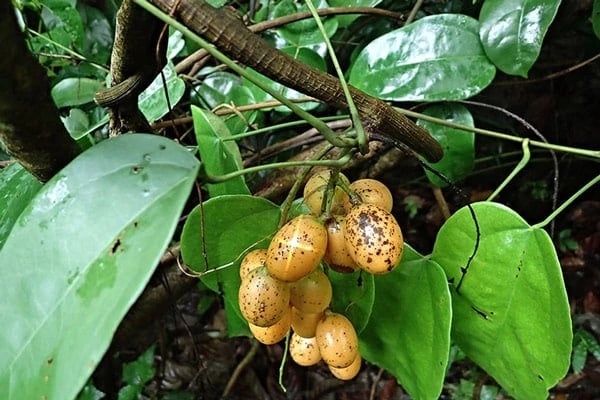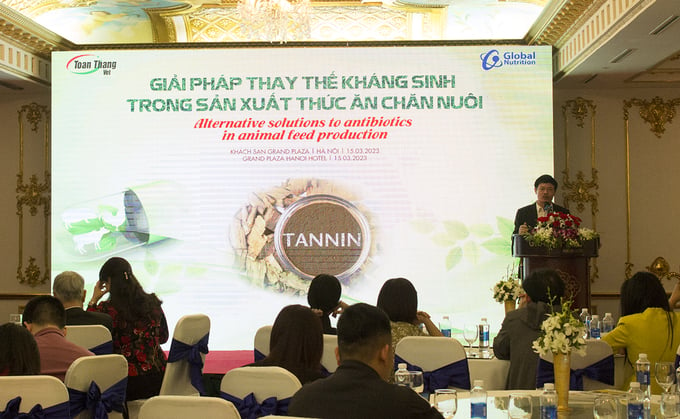November 25, 2025 | 19:59 GMT +7
November 25, 2025 | 19:59 GMT +7
Hotline: 0913.378.918
November 25, 2025 | 19:59 GMT +7
Hotline: 0913.378.918

The extract from the common fibraurea stem (Fibraurea tinctoria Lour) is considered a miracle antibiotic made from herbs. Photo: Quang Linh.
According to Pham Kim Dang, Deputy Director of Department of Livestock Production, Vietnam is classified as a country with a high antimicrobial resistance rate in the world and has received many warnings from the World Health Organization (WHO).
Facing the current situation, in addition to promulgating regulations on banning the use of antibiotics, the Ministry of Agriculture and Rural Development and research organizations have come up with many alternatives to antibiotics at all stages, from seed selection to mixing feed ingredients with herbal compounds.
The business community and research units have developed many product lines at present to replace antibiotics, such as organic acids mixed with Probiotics in animal feed to compete with harmful microorganisms, or Enzyme supplements to enhance livestock’s digestibility.
The most prominent are the product lines related to herbs. These are the product lines that take advantage of Vietnam's abundant herbal raw materials and can effectively replace many antibiotics in livestock production.
Herbal antibiotics extracted from the common fibraurea stem (Fibraurea tinctoria Lour) are optimally mixed with animal feed, thereby stabilizing the digestive tract of livestock. When mixed with animal feed, the active ingredient Berberin present in the common fibraurea stem will specifically help kill or inhibit the growth of bacteria, especially bacteria related to the digestive tract and intestinal tract, without affecting the beneficial bacterial systems. In particular, the drug resistance trait of Berberin is extremely low.
These are proofs that farmers can sustainably use herbal antibiotic products to limit the use of synthetic antibiotics in protecting animal health.

Ha Minh Tuan, Deputy Director of Toan Thang Veterinary Medicine Joint Stock Company. Photo: Quang Linh.
Ha Minh Tuan, Deputy Director of Toan Thang Veterinary Medicine Joint Stock Company, said that in order to reduce the use of antibiotics, first of all, the resistance of livestock needs to be strengthened. Toan Thang Veterinary Medicine JSC is also developing and providing the market with many alternatives to popular antibiotics such as organic acids and herbal extracts that limit the activity of harmful microorganisms.
Hydrolyzed tannin is a prime example. This is a product that contributes to protecting the intestinal tract, preventing the growth of harmful microorganisms, improving the rate of feed conversion and strengthening the immune system, thus considered a great way to reduce the use of antibiotics in livestock production.
The product lines that are a combination of calcium butyrate and calcium lactate with organic acids will curb and prevent harmful bacteria in the intestinal tract and stimulate the development of the digestive system. Mixing products containing organic acids into livestock’s drinking water will disinfect the water and improve the water quality, thereby strengthening the immune system of livestock.

Alternatives for antibiotics in animal husbandry are receiving more and more attention from domestic and foreign businesses. Photo: Quang Linh.
The development viewpoint of the livestock development strategy in the period 2021 - 2030, vision 2045 of the Ministry of Agriculture and Rural Development also clearly states "Development of livestock industry towards industrialization and modernization, while promoting organic animal husbandry and traditional animal husbandry towards high quality and safe goods production".
This strategy also encourages the strong development of industries that produce raw materials and supplements, especially biotechnology in order to supply sufficient biological products to replace antibiotics and chemicals used in animal husbandry, thus improving the value of nutritional sources of agricultural and industrial by-products in the country.
In addition, the strategy aims to improve the ability to control epidemics, especially the control of dangerous diseases affecting livestock and diseases that spread to people, ensuring epidemic safety, food safety, and meeting the increasing demand for domestic consumption and export.
Apart from the consequences related to reducing the ability to treat drugs, anti-drug bacteria also indirectly increase production and veterinary costs. This makes the competitiveness of domestic products significantly decrease in comparison to the same items imported from countries that control the use of antibiotics in livestock production well. Alternatives for antibiotics in animal husbandry are receiving more and more attention from domestic and foreign businesses.
Translated by Samuel Pham
/2025/11/24/3536-2-112800_176.jpg)
(VAN) Dong Nai now has tens of thousands of hectares of forests certified for sustainable management, and this area will continue to be expanded in the coming period.

(VAN) Vinh Ha hamlet (Dai Xuyen commune, Hanoi) is shifting away from small-scale farming as households adopt bioscurity into their breeder chicken models.

(VAN) Heavy rains make aquatic species more vulnerable to disease. Proactive water management and high-tech systems help farmers prevent outbreaks and protect yields.

(VAN) Greenhouses are shifting production mindsets in Binh Lu commune, enabling farmers to ‘weather the sun and rain’ and secure stable vegetable harvests throughout the year.

(VAN) Green transition is crucial for the Mekong Delta amid climate change and stricter standards, offering a path toward sustainability.

(VAN) Dong Thap promotes agricultural restructuring, forms large specialized farming zones, raises the value of agricultural products and develops toward ecological and high-tech directions.
/2025/11/22/4018-4-213342_747.jpg)
(VAN) The Mekong Delta Agricultural Experts Club has attracted 143 experts and researchers to participate in providing consultancy and contributing initiatives to the development of one million hectares of high-quality rice.